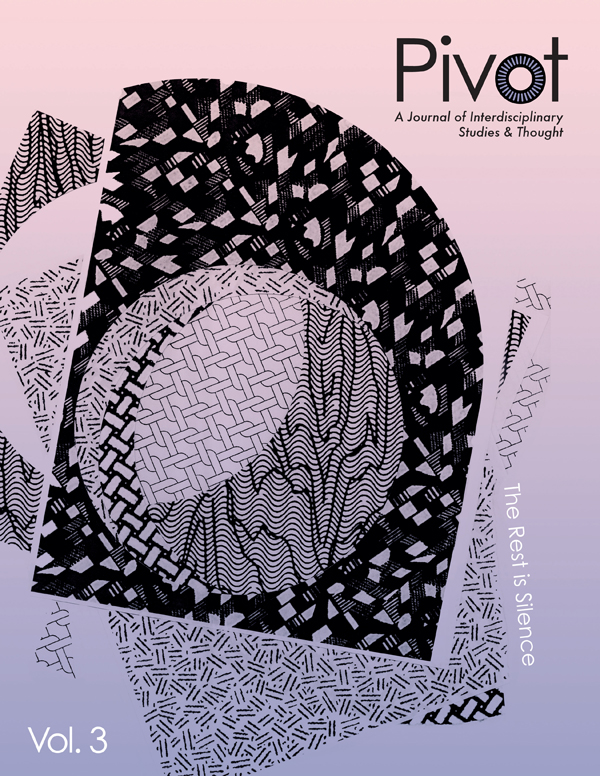"I's Natural Homicidal": Violence and Silence in Execution Poems
DOI:
https://doi.org/10.25071/2369-7326.36108Abstract
The inescapable presence of violence throughout George Elliott Clarke's oeuvre proposes that the silence imposed on the black community is only overcome through violence. The inevitability of violence is particularly evident in his collection Execution Poems. This collection recounts the “Tragedy of George and Rue,” cousins of his mother who killed and robbed a white taxi driver and were then the last people hanged as state punishment in New Brunswick. Through protagonists’ rationalizations for the crime and with their familial connection to him, Clarke collapses time and justice to place the black man outside of history and within violence. Silence then becomes a visceral experience for black males. Clarke suggests that Western society enacts its silencing of the black male through violence, thus combating this enforced voicelessness becomes a matter of violent vengeance: the only expression impossible to ignore. In a reflection of a peculiar position of blackness in Canada, the inescapability of violence for the black man who wishes to express his subjective being is grounded in a Western history of violence as retribution, which culminates in the diasporic struggle for black equality as enacted by black Americans. Clarke uses intertextual references to Shakespeare's Titus Andronicus and the iconic slave rebellion leader Nat Turner to locate his characters in a greater mythology of the battle for self-actualization, for a voice. Clarke himself is implicated in this violence, despite his recuperative ability to write poetry. The violence which drives the aptly titled Execution Poems reflects his belief that black literature still functions as a transgression for the wider community. Clarke posits the escape from this silence as an inherent act of violence.References
Baraka, Amiri. “Black Art.” Transbluesency. New York: Marsilio, 1995. Print.
“Books and Writing with Ramona Koval.” Radio National. 30 April 2005. Web. 15 Jan. 2007.
Butler, Judith. Excitable Speech: a Politics of the Performative. New York: Routledge, 1997. Print.
Clarke, George Elliott. “Contesting a Model Blackness: A Meditation on African-Canadian African-Americanism, or the Structures of African-Canadianité.” Odysseys Home: Mapping African-Canadian Literature. Toronto: U of Toronto P, 2002. 27-70. Print.
Clarke, George Elliott. Execution Poems. Wolfville: Gaspereau Press, 2001. Print.
Clarke, George Elliott. Whylah Falls, 10th Anniversary Ed. Vancouver: Polestar, 2000. Print.
Compton, Anne. “Standing Your Ground: George Elliott Clarke in Conversation.” Studies in Canadian Literature 23:2 (1998): 138- 164. Print.
Compton, Wayde and Kevin McNeilly. “The Crime of Poetry: George Elliott Clarke in Conversation.” Canadian Literature: A Quarterly of Criticism and Review 182 (2004): 53-64. Print.
Fiorentino, Jon Paul. “Blackening English: The Polyphonic Poetics of George Elliott Clarke.” Poetics.ca 2 (2003): n.pag. Web. 15 Jan. 2007.
Gates, Henry Louis. The Signifying Monkey: Theory of African- American Literary Criticism. NY: Oxford UP, 1988.
Greenblatt, Jordana. “Something Sadistic, Something Complicit: Text and Violence in Execution Poems and thirsty.” Canadian Literature 197 (2008): 80-95, 200. Print.
Henderson, Stephen E. “Survival Motion”: A Study of the Black Writer and the Black Revolution in America.” The Militant Black Writer in Africa and the United States. Madison: U of Wisconsin P, 1969. 63-75. Print.
Kyser, Kristina. “George and Ruth: An Interview with George Elliott Clarke about Writing and Ethics.” University of Toronto Quarterly 76.3 (2007): 861-873. Print. DOI: https://doi.org/10.3138/utq.76.3.861
Knutson, Susan. “‘I am become Aaron’: George Elliott Clarke’s Execution Poems and William Shakespeare’s Titus Andronicus.” Canadian Cultural Exchange. Eds. Norman Cheadle and Lucien Pelletier. Waterloo, ON: Wilfried Laurier P, 2007. 29-58. Print.
Lane, M. Travis. “An Unimpoverished Style: The Poetry of George Elliot Clarke.” Canadian Poetry: Studies, Documents, Reviews 16 (1985): 45-74. Print.
McKittrick, Katherine. Demonic Grounds: Black Women and the Cartographies of Struggle. Minneapolis: U of Minnesota P, 2006. Print.
“Nat Turner’s Rebellion.” Africans in America—PBS. Web. 15 Jan. 2007.
“Pall.” Oxford English Dictionary. Web. 15 Jan. 2007.
Philip, M. NourbeSe. “Earth and Sound: The Place of Poetry.” A Genealogy of Resistance and Other Essays. Toronto: Mercury, 1997. 57-73. Print.
Philip, M. NourbeSe. “Echoes in a Stranger Land.” Frontiers: Essays and Writings on Racism and Culture, 1984-1992. Toronto: Mercury, 1992. 9-25. Print.
Shakespeare, William. Titus Andronicus. Ed. Alan Hughes. New York: Cambridge UP, 1994. Print.
Walcott, Rinaldo. Black Like Who?: Writing Black Canada. Toronto: Insomniac, 2003. Print.

